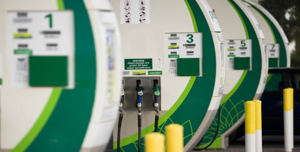bp and thyssenkrupp Steel work together to advance the decarbonization of steel production
bp and thyssenkrupp Steel announced they have signed a memorandum of understanding (MoU) focused on the development of long-term supply of low carbon hydrogen and renewable power in steel production, helping accelerate the steel industry’s wider energy transition.
thyssenkrupp Steel accounts for 2.5 percent of CO2 emissions in Germany, mainly at the Duisburg site where the main emitters, the blast furnaces, are operated. By replacing the coal-fired blast furnaces with direct reduction plants where iron ore is reduced with low-carbon hydrogen, thyssenkrupp Steel intends to make steel production climate-neutral in the long term.
The companies will explore supply options for both blue and green hydrogen, as well as power from wind and solar generation through the use of power purchase agreements.
William Lin, bp’s executive vice president regions, cities and solutions said: “The steel and energy industries have of course long been closely linked. We provide fuel and feedstock for steel production while our platforms, pipelines, and turbine towers are made from steel.
“thyssenkrupp Steel has the ambition to make its steel production climate-neutral by 2045 and low carbon power and hydrogen will play a critical role in achieving that. As part of our strategy to provide a range of decarbonization solutions to corporates, bp is already investing in and working to develop a portfolio of industrial-scale hydrogen projects in Germany, the Netherlands, Spain, the UK and Australia. With our aligned ambitions and complementary investments, thyssenkrupp Steel and bp can together help this hard-to-abate sector decarbonize faster.”
Dr. Arnd Köfler, Chief Technology Officer at thyssenkrupp Steel, added: "The decarbonisation of the steel industry will require enormous quantities of low-carbon and in the long term green hydrogen. This will increasingly require the use of electricity from renewable sources. All this can only be achieved through a well-developed hydrogen infrastructure with a supra-regional pipeline network. The MoU is an important milestone for us to set the course with bp for a reliable supply of energy in the future."
Steel accounts for 8 to 11% of global CO2 emissions. It is essential for the automotive and construction industries and for the manufacturing of industrial machinery. It also forms the foundation for a string of decarbonization technologies, including wind turbines, generators and smart power grids.
The companies also intend to jointly advocate for policies that will support the development of low carbon hydrogen and the growth of green steel in Europe.
thyssenkrupp Steel currently produces 11 MMt of crude steel per year and is targeting the production of 400,000 tons of CO2-reduced steel by 2025.
bp is working to pursue green hydrogen production at its refineries in Lingen in Germany, Rotterdam in the Netherlands, and Castellón in Spain. It is developing both blue and green hydrogen production projects around the world, including in the UK and Australia.







Comments